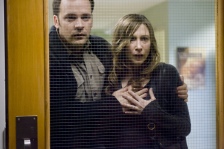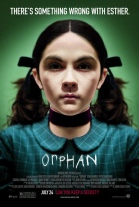Orphan
|  Arriving so close on the heels of George Ratliff’s superb psychodrama Joshua (2007), there is a real danger that Orphan will be too easily dismissed as yet another generic retread of that particularly uneasy domain of horror populated by evil children. To be sure, Orphan is a much more conventional horror thriller, with Spanish director Jaume Collet-Serra orchestrating so many jolts and faux jolts and menacing tracking shots within the first half hour that you begin to wonder whether there is a genuine story to be told or if it’s all just an excuse to jack with the audience’s expectations. It turns out that the movie is both, because in a clever and convincing third-act twist, Orphan reveals itself to be not just another horrorshow about a preternaturally manipulative and malevolent child, but rather a carefully staged deconstruction of our assumptions about horrorshows about preternaturally manipulative and malevolent children. Without giving too much away, I can say that the film banks on our willingness to suspend disbelief that a 9-year-old girl could get the best of otherwise normal and intelligent adults and then smacks us upside the head with it. Arriving so close on the heels of George Ratliff’s superb psychodrama Joshua (2007), there is a real danger that Orphan will be too easily dismissed as yet another generic retread of that particularly uneasy domain of horror populated by evil children. To be sure, Orphan is a much more conventional horror thriller, with Spanish director Jaume Collet-Serra orchestrating so many jolts and faux jolts and menacing tracking shots within the first half hour that you begin to wonder whether there is a genuine story to be told or if it’s all just an excuse to jack with the audience’s expectations. It turns out that the movie is both, because in a clever and convincing third-act twist, Orphan reveals itself to be not just another horrorshow about a preternaturally manipulative and malevolent child, but rather a carefully staged deconstruction of our assumptions about horrorshows about preternaturally manipulative and malevolent children. Without giving too much away, I can say that the film banks on our willingness to suspend disbelief that a 9-year-old girl could get the best of otherwise normal and intelligent adults and then smacks us upside the head with it.The orphan of the title is a dark-haired little girl named Esther (Isabelle Fuhrman), who is adopted from a Catholic orphanage by Kate (Vera Farmiga, who also played the mother in Joshua) and John Coleman (Peter Sarsgaard), an attractive upper-class couple who already have a preteen son named Daniel (Jimmy Bennett) and a younger daughter named Max (Aryana Engineer), who happens to be deaf. In a rather gratuitous and unnecessary opening nightmare, we discover that Kate lost a third child during labor, and thus the adoption of Esther is an attempt at healing the wounds of the past and completing their family. There is some understandable tension once Esther enters the family, with Daniel feeling marginalized by his new sibling while Kate and John attempt to smooth over some of their own relational rough spots. As you might have guessed, Esther is no ordinary child, and in some ways she seems like she has been special-ordered from the Eastern European School of Scary Children. While there is minimal paperwork to explain her background, the nun who runs the orphanage (CCH Pounder) says that Esther came from Russia and (alert! alert!) had already been adopted once by an American family who tragically died in a house fire. Esther stands out from other children not only because she is mature beyond her years in both her intelligence and her mannerisms, but because she also seems to be trapped in some 19th-century time-warp with her predilection for frumpy Victorian doll dresses and ribbons. Esther’s general weirdness quickly gives way to more sadistic and violent underpinnings, but what is most unnerving about her is how, like Joshua, she somehow knows just what buttons to push in order to manipulate those around her. Whether it be learning sign language in order to get Max on her side or playing on John’s paternal sympathies or pressing the lingering doubts and ill feelings about Kate’s tenuous conquering of alcoholism, Esther has a way of having her way, even if we don’t really know what her endgame is until the final reel. Granted, some of Orphan is a bit overcooked for its own good; in addition to the aforementioned overreliance on jump moments and an out-of-place bloody dream sequence, the film leans heavily on relatively inexplicable behavior, notably the fact that Kate and John would adopt Esther in the first place, not only because they know virtually nothing about her, but because she is so clearly out of synch with the rest of their family. Otherwise, though, the film works its psychological angles well, giving us gradually cohesive clues about the barely hidden fractures in the Coleman family and then showing how Esther is able to manipulate them to her advantage (the idea of hidden torment is one of the film’s underlying themes, visually represented by Esther’s use of black-light paint in her artwork). Screenwriter David Leslie Johnson (working from a story by Alex Mace) is also quite good at managing our sympathies, particularly in the way he at first directs Esther’s violence against characters who are cruel to her (particularly a snide little blonde at her school) before unleashing it on those who don’t deserve it. All of this builds to a rather conventional slasher-type climax, but the build-up of tension and the twist revelation are more than enough to sustain it. Copyright ©2009 James Kendrick Thoughts? E-mail James Kendrick All images copyright © Warner Bros. Pictures |
Overall Rating: 

 (3)
(3)


